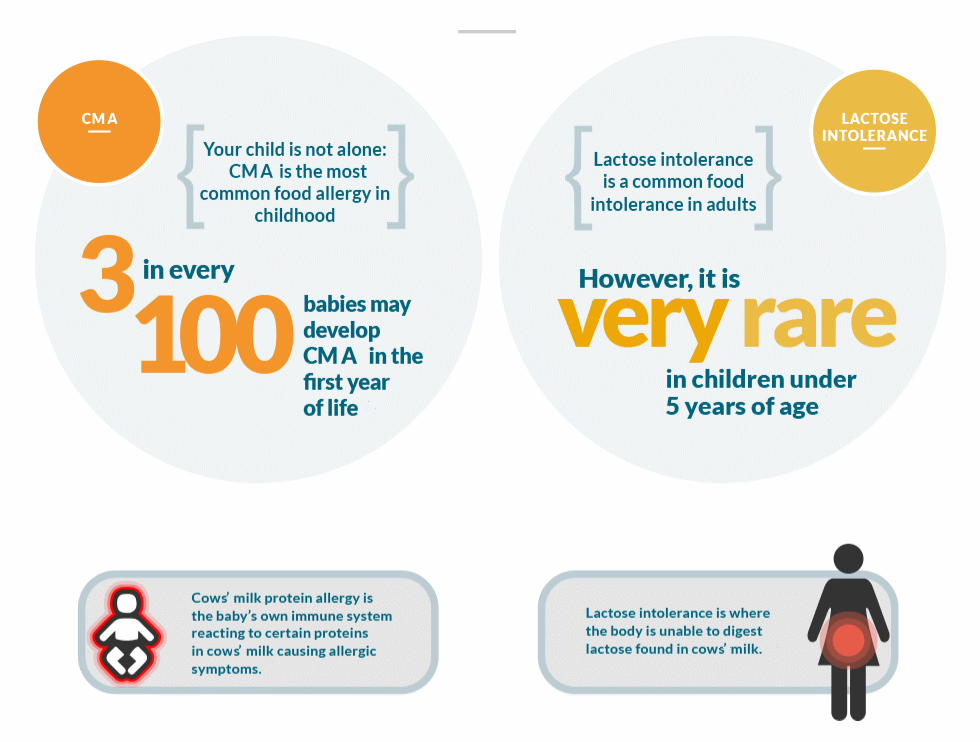CMA usually develops before a baby's first birthday
Approximately 3 out of every 100 babies will develop CMA in their first year of life.
CMA is very rare in children older than 5 years of age.

Nestlé Health Science UK Statement on Demand for Specialist Infant Formulas for Cows’ Milk and Multiple Food Allergies
We believe breast milk is the best food for infants. When in consultation with their healthcare professional, mothers and families find that optimal breastfeeding is not possible due to their infant’s medical condition, formulas for special medical purposes play a vital role in providing essential nutrients to infants. We have a global commitment to market breast-milk substitutes responsibly.
This website is about the management of cows’ milk protein allergy and nutritional solutions intended for infants. By continuing on this website, you accept that Nestlé Health Science supplies the information at your own request.
Are you a healthcare professional (HCP) or a parent?
Cow’s milk protein allergy (CMPA) is the most common food allergy in babies. CMPA is a type of milk allergy where a baby's immune system responds to the proteins found in cows’ milk, mistaking it for a harmful substance and attacks it, causing the baby to have allergic symptoms. These can include problems with the skin (rash, hives, dry, scaly or itchy skin), digestive system (diarrhoea, vomiting, constipation and reflux) and respiratory system (noisy breathing, coughing, runny nose). CMA usually occurs before a baby’s first birthday.
CMPA is caused by the immune system mistaking one or more of the proteins found in cows' milk to be a harmful substance. This triggers an allergic reaction in response. It is not believed that CMPA is genetic or triggered by a specific incident.
Unfortunately, cows' milk protein allergy is very common, with the risk being highest in infants. 2-3% of babies under the age of one years old suffer with CMPA. As children get older, the risk decreases.
If a parent or sibling has an allergic disease such as asthma, eczema, or any seasonal allergies, then the risk of developing CMPA is increased. There's evidence to suggest breastfeeding protects babies from developing CMPA.
There are two types of cows' milk protein allergy depending on how the immune system reacts. The first type is defined by symptoms that are ‘immediate’. This is when symptoms are caused by the immunoglobulin E antibody (IgE). Typically, these allergic symptoms happen within minutes of consuming cow’s milk or up to two hours afterwards. This is known as IgE-mediated.
The other type of CMPA is ‘delayed’, where symptoms are slow to appear. This is described as non-IgE mediated and is the most common type. The symptoms usually develop from two hours after consumption but can take up to a week to appear.
CMPA is commonly confused with lactose intolerance but they are very different: lactose intolerance does not involve the body's immune system. The two share some similar signs and symptoms, such as stomach and gut problems (like wind and diarrhoea).
It is important to know the difference between lactose intolerance and CMPA, as the two have different causes and also treatments; in addition, CMPA usually develops early in life, whereas lactose intolerance is extremely rare before the age of 5 years.
Use our symptom checker here to see if your baby has any symptoms of CMPA.
Lactose intolerance does not involve the immune system. Instead, it is the inability to digest the lactose sugar found in cows’ milk, and it is very rare in children younger than 5 years of age. Lactose is one of the most important carbohydrates (sugars) in breast milk and provides many benefits to babies, such as helping to promote a healthy gut and calcium absorption.

Lactose intolerance is where the body is unable to digest lactose that is found in cows' milk. Whereas, CMPA is a baby's own immune system reacting to certain proteins that are found in cows' milk, which causes the allergic symptoms.
Lactose intolerance is much more common in adults than it is infants. In fact, it's very rare for children under the age of 5 to develop lactose intolerance. But, CMPA is the most common childhood food allergy.

Understand the signs and symptoms of CMA
Symptoms of CMPA may affect the digestive system, respiratory system and the skin.
Learn more about the common signs and symptoms of CMPA
How do I get CMPA diagnosed?
Diagnosing CMPA can be challenging. If CMPA is suspected, you should visit a doctor who can assess and if necessary perform specific tests to help make a diagnosis.
Learn more about the diagnosis
How can I prepare for the doctor’s visit?
For a faster and accurate diagnosis of CMPA by your doctor, the SmilesBack app helps you to easily record and keep track of your baby’s symptoms and feeds in preparation for your doctor’s appointment.